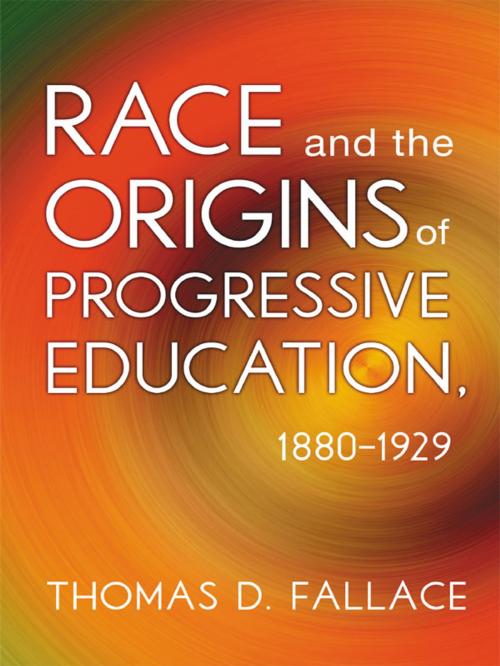Race and the Origins of Progressive Education, 1880–1929
Nonfiction, Reference & Language, Education & Teaching, History, Educational Theory, Philosophy & Social Aspects| Author: | Thomas D. Fallace | ISBN: | 9780807773772 |
| Publisher: | Teachers College Press | Publication: | December 15, 2009 |
| Imprint: | Language: | English |
| Author: | Thomas D. Fallace |
| ISBN: | 9780807773772 |
| Publisher: | Teachers College Press |
| Publication: | December 15, 2009 |
| Imprint: | |
| Language: | English |
This penetrating historical study traces the rise and fall of the theory of recapitulation and its enduring influence on American education. Inherently ethnocentric and racist, the theory of recapitulation was pervasive in the social sciences at the turn of the 20th century when early progressive educators uncritically adopted its basic tenets. The theory pointed to the West as the developmental endpoint of history and depicted people of color as ontologically less developed than their white counterparts. Building on cutting-edge scholarship, this is the first major study to trace the racial worldviews of key progressive thinkers, such as Colonel Francis W. Parker, John Dewey, Charles Judd, William Bagley, and many others.
Chapter Summaries:
- “Roots” traces the intellectual context from which the new, child-centered education emerged.
- “Recapitulation” explains how racially segregated schools were justified and a differentiated curriculum was rationalized.
- “Reform” explores some of the most successful early progressive educational reforms, as well as the contents of children’s literature and popular textbooks.
- “Racism” documents the constancy of the idea of racial hierarchy among progressive educators, such as Edward Thorndike, G. Stanley Hall, and William Bagley.
- “Relativity” documents how scholars such as W. E. B. Du Bois, Carter Woodson, Horace Kallen, and Randolph Bourne outlined a new inclusive ideology of cultural pluralism, but overlooked the cultural relativism of anthropologist Franz Boas.
- “Refashioning,” examines the enduring effects of recapitulation on education, such as child-centered teaching and the deficit approach to students of color.
“For American scholars, 'progressive education' is something of a talisman: we all give it ritual worship, but we rarely question its origins or premises. By contrast, race has become perhaps the dominant theme in contemporary educational studies. In this bold and brilliant study, Thomas Fallace uses our present-day racial lens to critique our historic dogmas about progressive education. We might not like what we see, but we should not look away.”
—Jonathan Zimmerman, New York University
“This is an important and provocative book. Fallace provides a thoughtful analysis of how race influenced the foundational ideas of progressive educators in America. He has made an important contribution to the history of curriculum and educational reform.”
—William B. Stanley, Professor , Curriculum and Instruction, Monmouth University
This penetrating historical study traces the rise and fall of the theory of recapitulation and its enduring influence on American education. Inherently ethnocentric and racist, the theory of recapitulation was pervasive in the social sciences at the turn of the 20th century when early progressive educators uncritically adopted its basic tenets. The theory pointed to the West as the developmental endpoint of history and depicted people of color as ontologically less developed than their white counterparts. Building on cutting-edge scholarship, this is the first major study to trace the racial worldviews of key progressive thinkers, such as Colonel Francis W. Parker, John Dewey, Charles Judd, William Bagley, and many others.
Chapter Summaries:
- “Roots” traces the intellectual context from which the new, child-centered education emerged.
- “Recapitulation” explains how racially segregated schools were justified and a differentiated curriculum was rationalized.
- “Reform” explores some of the most successful early progressive educational reforms, as well as the contents of children’s literature and popular textbooks.
- “Racism” documents the constancy of the idea of racial hierarchy among progressive educators, such as Edward Thorndike, G. Stanley Hall, and William Bagley.
- “Relativity” documents how scholars such as W. E. B. Du Bois, Carter Woodson, Horace Kallen, and Randolph Bourne outlined a new inclusive ideology of cultural pluralism, but overlooked the cultural relativism of anthropologist Franz Boas.
- “Refashioning,” examines the enduring effects of recapitulation on education, such as child-centered teaching and the deficit approach to students of color.
“For American scholars, 'progressive education' is something of a talisman: we all give it ritual worship, but we rarely question its origins or premises. By contrast, race has become perhaps the dominant theme in contemporary educational studies. In this bold and brilliant study, Thomas Fallace uses our present-day racial lens to critique our historic dogmas about progressive education. We might not like what we see, but we should not look away.”
—Jonathan Zimmerman, New York University
“This is an important and provocative book. Fallace provides a thoughtful analysis of how race influenced the foundational ideas of progressive educators in America. He has made an important contribution to the history of curriculum and educational reform.”
—William B. Stanley, Professor , Curriculum and Instruction, Monmouth University















